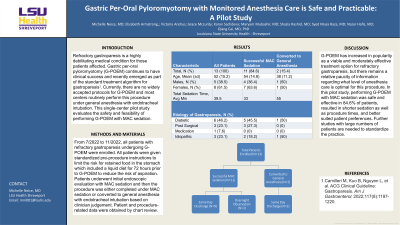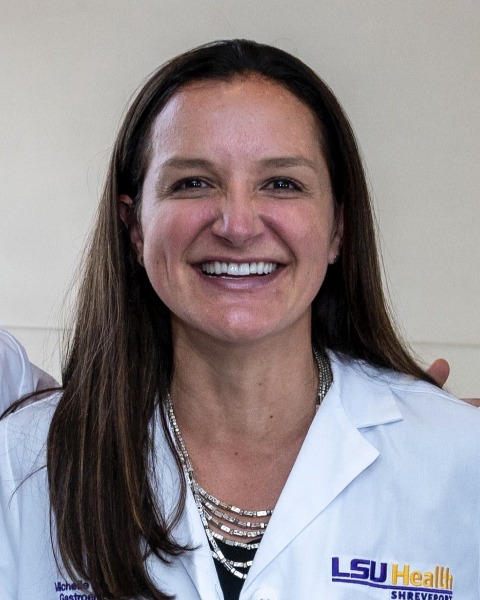Monday Poster Session
Category: Interventional Endoscopy
P2285 - Gastric Per-Oral Pyloromyotomy With Monitored Anesthesia Care Is Safe and Practicable: A Pilot Study
Monday, October 23, 2023
10:30 AM - 4:15 PM PT
Location: Exhibit Hall

Has Audio

Michelle Neice, MD
LSU Health Sciences Center
Shreveport, LA
Presenting Author(s)
Michelle Neice, MD, Elizabeth Armstrong, BA, Victoria Andrus, , Grace McCurdy, , Karan Sachdeva, MD, Maryam Mubashir, MD, Shazia Rashid, MD, Syed Musa Raza, MD, Nazar Hafiz, MD, Qiang Cai, MD, PhD, MACG
LSU Health Sciences Center, Shreveport, LA
Introduction: Refractory gastroparesis is a debilitating medical condition for patients affected. Gastric per-oral pyloromyotomy (G-POEM) continues to have clinical success and recently emerged as part of the standard treatment algorithm for gastroparesis. Currently, there are no widely accepted protocols for G-POEM and most centers routinely perform this procedure under general anesthesia with endotracheal intubation. This single-center pilot study evaluates the safety and feasibility of performing G-POEM with MAC sedation.
Methods: From 7/22 to 11/22, all patients with refractory gastroparesis undergoing G-POEM were enrolled. All patients were given standardized pre-procedure instructions to limit the risk for retained food in the stomach including a liquid diet for 72 hours prior to G-POEM. Patients underwent endoscopic evaluation with MAC sedation and then the procedure was either completed under MAC sedation or converted to general anesthesia with endotracheal intubation based on clinician judgement. Patient and procedure-related data were obtained by chart review.
Results: A total of 13 patients were enrolled and all expressed preference for MAC sedation compared to general anesthesia if the medical team felt it was safe. Of these, 2 (15.4%) had their procedure converted to general anesthesia due to retained gastric contents on initial endoscopic evaluation. Of the 11 (84.6%) patients that underwent G-POEM with MAC sedation, 9 (81.8%) were discharged home the same day. Two patients were admitted for overnight observation related to abdominal discomfort and no admits were due to anesthesia-related issues. The 2 cases converted to general anesthesia discharged home same day. Average sedation time for cases done under converted general anesthesia vs. MAC was 55 minutes and 33 minutes, respectively. Technically, G-POEM was successful in all cases. Of the 13 enrolled patients, 9 had symptom severity quantification pre and at least 30-days post G-POEM. All 9 reported clinical improvement during follow up after the procedure with an average of 49.4% improvement in Gastroparesis Cardinal Symptom Index (GCSI) scores.
Discussion: Despite its increased popularity, there remains a paucity of information regarding optimal anesthesia care for G-POEM. In this pilot study, performing G-POEM with MAC sedation was safe and effective in 84.6% of patients, resulted in shorter sedation times, and better suited patient preferences. Further studies with large numbers of patients are needed to standardize the practice.
Disclosures:
Michelle Neice, MD, Elizabeth Armstrong, BA, Victoria Andrus, , Grace McCurdy, , Karan Sachdeva, MD, Maryam Mubashir, MD, Shazia Rashid, MD, Syed Musa Raza, MD, Nazar Hafiz, MD, Qiang Cai, MD, PhD, MACG. P2285 - Gastric Per-Oral Pyloromyotomy With Monitored Anesthesia Care Is Safe and Practicable: A Pilot Study, ACG 2023 Annual Scientific Meeting Abstracts. Vancouver, BC, Canada: American College of Gastroenterology.
LSU Health Sciences Center, Shreveport, LA
Introduction: Refractory gastroparesis is a debilitating medical condition for patients affected. Gastric per-oral pyloromyotomy (G-POEM) continues to have clinical success and recently emerged as part of the standard treatment algorithm for gastroparesis. Currently, there are no widely accepted protocols for G-POEM and most centers routinely perform this procedure under general anesthesia with endotracheal intubation. This single-center pilot study evaluates the safety and feasibility of performing G-POEM with MAC sedation.
Methods: From 7/22 to 11/22, all patients with refractory gastroparesis undergoing G-POEM were enrolled. All patients were given standardized pre-procedure instructions to limit the risk for retained food in the stomach including a liquid diet for 72 hours prior to G-POEM. Patients underwent endoscopic evaluation with MAC sedation and then the procedure was either completed under MAC sedation or converted to general anesthesia with endotracheal intubation based on clinician judgement. Patient and procedure-related data were obtained by chart review.
Results: A total of 13 patients were enrolled and all expressed preference for MAC sedation compared to general anesthesia if the medical team felt it was safe. Of these, 2 (15.4%) had their procedure converted to general anesthesia due to retained gastric contents on initial endoscopic evaluation. Of the 11 (84.6%) patients that underwent G-POEM with MAC sedation, 9 (81.8%) were discharged home the same day. Two patients were admitted for overnight observation related to abdominal discomfort and no admits were due to anesthesia-related issues. The 2 cases converted to general anesthesia discharged home same day. Average sedation time for cases done under converted general anesthesia vs. MAC was 55 minutes and 33 minutes, respectively. Technically, G-POEM was successful in all cases. Of the 13 enrolled patients, 9 had symptom severity quantification pre and at least 30-days post G-POEM. All 9 reported clinical improvement during follow up after the procedure with an average of 49.4% improvement in Gastroparesis Cardinal Symptom Index (GCSI) scores.
Discussion: Despite its increased popularity, there remains a paucity of information regarding optimal anesthesia care for G-POEM. In this pilot study, performing G-POEM with MAC sedation was safe and effective in 84.6% of patients, resulted in shorter sedation times, and better suited patient preferences. Further studies with large numbers of patients are needed to standardize the practice.
Disclosures:
Michelle Neice indicated no relevant financial relationships.
Elizabeth Armstrong indicated no relevant financial relationships.
Victoria Andrus indicated no relevant financial relationships.
Grace McCurdy indicated no relevant financial relationships.
Karan Sachdeva indicated no relevant financial relationships.
Maryam Mubashir indicated no relevant financial relationships.
Shazia Rashid indicated no relevant financial relationships.
Syed Musa Raza indicated no relevant financial relationships.
Nazar Hafiz indicated no relevant financial relationships.
Qiang Cai indicated no relevant financial relationships.
Michelle Neice, MD, Elizabeth Armstrong, BA, Victoria Andrus, , Grace McCurdy, , Karan Sachdeva, MD, Maryam Mubashir, MD, Shazia Rashid, MD, Syed Musa Raza, MD, Nazar Hafiz, MD, Qiang Cai, MD, PhD, MACG. P2285 - Gastric Per-Oral Pyloromyotomy With Monitored Anesthesia Care Is Safe and Practicable: A Pilot Study, ACG 2023 Annual Scientific Meeting Abstracts. Vancouver, BC, Canada: American College of Gastroenterology.
